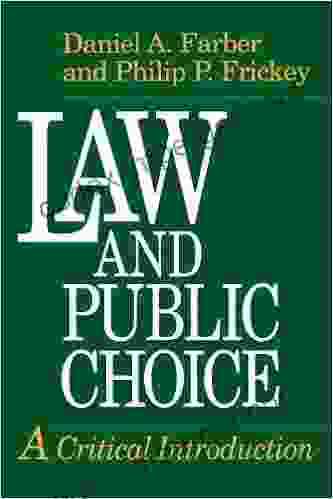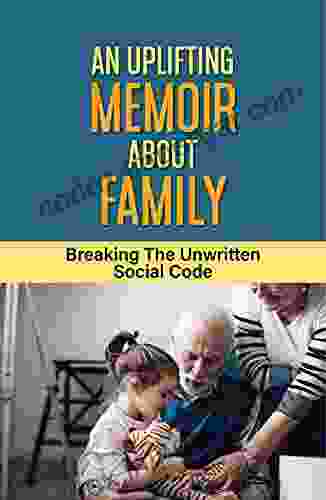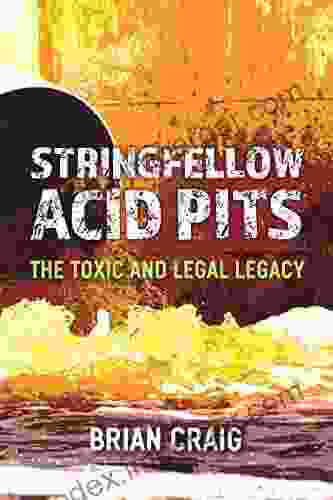Law and Public Choice: A Critical Introduction

Law and economics, also known as "economic analysis of law" or "law and public choice," is a field of study that combines the tools of microeconomics and game theory with the study of law.
Law and economics scholars seek to understand how legal rules affect individual behavior and social outcomes, and to use this understanding to design more efficient and effective legal systems.
In recent years, law and economics has become increasingly influential in a wide range of policy areas, including antitrust, environmental regulation, and tort law. However, the field has also been the subject of considerable controversy, with critics arguing that it is too simplistic, that it ignores important social values, and that it can be used to justify unjust or harmful policies.
4.5 out of 5
| Language | : | English |
| File size | : | 2462 KB |
| Text-to-Speech | : | Enabled |
| Word Wise | : | Enabled |
| Print length | : | 169 pages |
| Lending | : | Enabled |
This article provides a critical to law and economics. It begins by discussing the basic concepts of the field, including the role of rational choice theory, the importance of incentives, and the distinction between efficiency and equity. The article then examines some of the most important applications of law and economics, including antitrust law, environmental regulation, and tort law. Finally, the article considers some of the criticisms of law and economics and discusses the future of the field.
The fundamental assumption of law and economics is that individuals are rational actors who seek to maximize their own utility. This assumption is based on the belief that people are capable of making rational decisions about their own lives and that they have the ability to compare different options and choose the one that they believe will bring them the greatest benefit.
The concept of rational choice theory is central to law and economics. Rational choice theory posits that individuals make decisions by weighing the costs and benefits of each option and choosing the option that they believe will bring them the greatest net benefit. This assumption is based on the belief that people are rational actors who are capable of making decisions that are in their own best interests.
The importance of incentives is another key concept in law and economics. Incentives are rewards or punishments that encourage or discourage certain behavior. Law and economics scholars argue that legal rules can be used to create incentives for individuals to behave in ways that are beneficial to society as a whole. For example, a law that imposes a tax on pollution can create an incentive for businesses to reduce their emissions.
The distinction between efficiency and equity is also important in law and economics. Efficiency refers to the allocation of resources in a way that maximizes the total benefit to society. Equity refers to the fair distribution of resources among individuals. Law and economics scholars argue that the goal of law should be to promote both efficiency and equity. However, they also recognize that these two goals can sometimes conflict, and that it is often necessary to make trade-offs between them.
Law and economics has been applied to a wide range of policy areas, including antitrust law, environmental regulation, and tort law.
Antitrust law
Antitrust law is designed to prevent monopolies and other anti-competitive practices. Law and economics scholars have argued that antitrust law can be used to promote economic efficiency by preventing businesses from engaging in behavior that reduces competition. For example, a law that prohibits mergers between competing businesses can prevent the creation of a monopoly, which would lead to higher prices and lower output.
Environmental regulation
Environmental regulation is designed to protect the environment from pollution and other harmful activities. Law and economics scholars have argued that environmental regulation can be used to promote economic efficiency by internalizing the costs of pollution. For example, a law that imposes a tax on pollution can create an incentive for businesses to reduce their emissions.
Tort law
Tort law is designed to compensate victims of injuries caused by the negligence or recklessness of others. Law and economics scholars have argued that tort law can be used to promote economic efficiency by deterring people from engaging in harmful behavior. For example, a law that allows victims of medical malpractice to sue their doctors for damages can create an incentive for doctors to be more careful.
Law and economics has been the subject of considerable controversy. Critics of the field argue that it is too simplistic, that it ignores important social values, and that it can be used to justify unjust or harmful policies.
Too simplistic
Critics of law and economics argue that the field is too simplistic and that it ignores the complexity of human behavior. They argue that people are not always rational actors who are capable of making decisions that are in their own best interests. They also argue that law and economics ignores the importance of social norms, emotions, and other factors that can influence human behavior.
Ignores important social values
Critics of law and economics also argue that the field ignores important social values, such as fairness, justice, and equality. They argue that law and economics is too focused on promoting economic efficiency and that it does not give enough weight to other important social values.
Can be used to justify unjust or harmful policies
Critics of law and economics also argue that the field can be used to justify unjust or harmful policies
4.5 out of 5
| Language | : | English |
| File size | : | 2462 KB |
| Text-to-Speech | : | Enabled |
| Word Wise | : | Enabled |
| Print length | : | 169 pages |
| Lending | : | Enabled |
Do you want to contribute by writing guest posts on this blog?
Please contact us and send us a resume of previous articles that you have written.
 Book
Book Novel
Novel Page
Page Chapter
Chapter Text
Text Story
Story Genre
Genre Reader
Reader Library
Library Paperback
Paperback E-book
E-book Magazine
Magazine Newspaper
Newspaper Paragraph
Paragraph Sentence
Sentence Bookmark
Bookmark Shelf
Shelf Glossary
Glossary Bibliography
Bibliography Foreword
Foreword Preface
Preface Synopsis
Synopsis Annotation
Annotation Footnote
Footnote Manuscript
Manuscript Scroll
Scroll Codex
Codex Tome
Tome Bestseller
Bestseller Classics
Classics Library card
Library card Narrative
Narrative Biography
Biography Autobiography
Autobiography Memoir
Memoir Reference
Reference Encyclopedia
Encyclopedia Bonnie Campbell
Bonnie Campbell Brian Black
Brian Black Brian Hawkins
Brian Hawkins Brittany Fenton
Brittany Fenton Bruce Miller
Bruce Miller Bryan Ferry
Bryan Ferry Buddhadasa Bhikkhu
Buddhadasa Bhikkhu Brian S Mahoney
Brian S Mahoney Books Kid
Books Kid Emily Mims
Emily Mims Thomas A Shannon
Thomas A Shannon Brian David Floyd
Brian David Floyd Brent Luvaas
Brent Luvaas Bob Kern
Bob Kern Gabriel Kuhn
Gabriel Kuhn Uri Kirsch
Uri Kirsch Bobby Owsinski
Bobby Owsinski Sarah Chayes
Sarah Chayes Brian Senior
Brian Senior Kyla Duffy
Kyla Duffy
Light bulbAdvertise smarter! Our strategic ad space ensures maximum exposure. Reserve your spot today!

 Bret MitchellInternational Institutions and Socioeconomic and Cultural Rights: A Catalyst...
Bret MitchellInternational Institutions and Socioeconomic and Cultural Rights: A Catalyst... Natsume SōsekiFollow ·10.1k
Natsume SōsekiFollow ·10.1k John GreenFollow ·14.8k
John GreenFollow ·14.8k Johnny TurnerFollow ·11.2k
Johnny TurnerFollow ·11.2k Connor MitchellFollow ·8.7k
Connor MitchellFollow ·8.7k Kirk HayesFollow ·8.2k
Kirk HayesFollow ·8.2k Dominic SimmonsFollow ·7.8k
Dominic SimmonsFollow ·7.8k Chase MorrisFollow ·18.2k
Chase MorrisFollow ·18.2k Scott ParkerFollow ·14.5k
Scott ParkerFollow ·14.5k
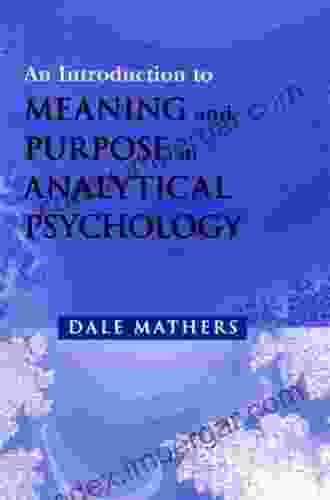
 Gary Cox
Gary CoxUnlocking Meaning and Purpose in Life: An Exploration of...
In an increasingly...

 Eric Hayes
Eric HayesMemoirs of the Early Pioneer Settlers of Ohio Illustrated
A Window into the Lives of Courageous...
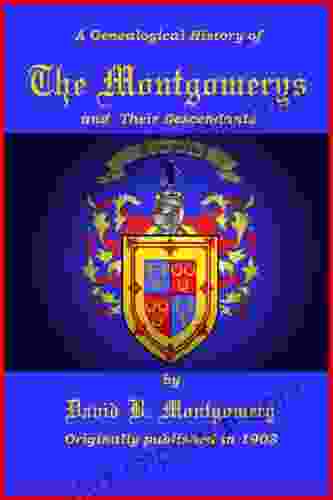
 J.R.R. Tolkien
J.R.R. TolkienThe Montgomerys and Their Descendants: A Saga of Courage,...
Prepare to be...

 Avery Simmons
Avery SimmonsThe Rifle Musket: The Dawn of Modern Infantry Warfare
: The rifle musket, a revolutionary...

 Jesse Bell
Jesse BellUnlock the Power of Excel with VBA and Macros: A...
Microsoft Excel is a powerful spreadsheet...
4.5 out of 5
| Language | : | English |
| File size | : | 2462 KB |
| Text-to-Speech | : | Enabled |
| Word Wise | : | Enabled |
| Print length | : | 169 pages |
| Lending | : | Enabled |


